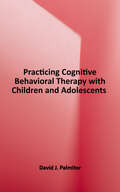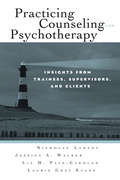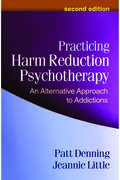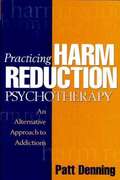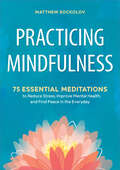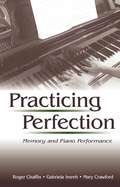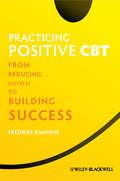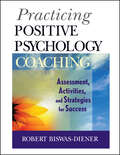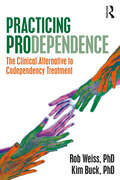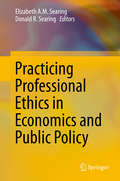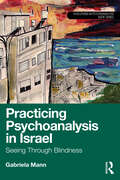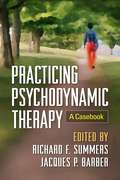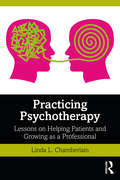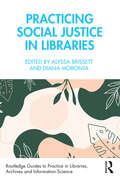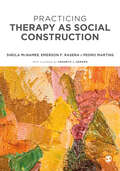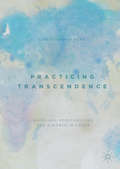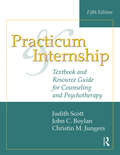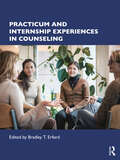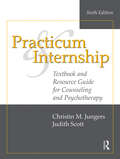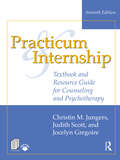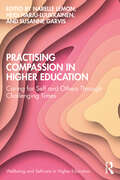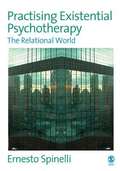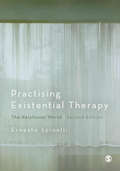- Table View
- List View
Practicing Cognitive Behavioral Therapy With Children and Adolescents: A Guide for Students and Early Career Professionals
by David J. PalmiterThe euro's life, while only slightly more than a decade long, has been riddled by a series of challenges and crises. The eruption of the Greek crisis in 2010 took European policymakers by surprise and forced them to design responses to a quickly deteriorating situation. Even though Europe has final begun to stabilize, the disparity between the prosperous Northern countries, especially Germany, and the plummeting Southern countries, including Spain and Greece, has exacerbated economic and political problems within the Eurozone. Amidst loud and frequent debates, solutions have been enacted, but the struggles facing this monetary union continue to develop even today. <p><p> The Euro Crisis and Its Aftermath was written to inform readers about the roots of this enduring European crisis and the alternative proposals for ending it. In four parts, Jean Pisani-Ferry explains the origins of the European currency, the build-up of imbalances and oversights that led to the crisis, the choices European policymakers have both addressed and ignored since 2010, and the evolution of the policy agenda and possible options for the future. The book is as much of an informative and analytical history as it is a discussion of solutions for a more prosperous European economy. <p><p> Rather than putting forth and supporting a thesis, Pisani-Ferry helps readers understand the past and present of the euro crisis and form their own opinions about potential solutions. This book is not intended to reach only economists, as time has long passed since European monetary unification was a debate limited to academics. This book is also for the policy makers searching for solutions, citizens of Europe enduring the consequences, and the international community that has felt the effects of an unstable Eurozone.
Practicing Counseling and Psychotherapy: Insights from Trainees, Supervisors and Clients
by Nicholas Ladany Jessica A. Walker Lia M. Pate-Carolan Laurie Gray EvansPracticing Counseling and Psychotherapy: Insights From Trainees, Supervisors, and Clients offers a framework for understanding the counseling and psychotherapy process that can be used in any training program. Clinical examples and discussion questions are included throughout the book, and are based on a large-scale empirical study that qualitatively and quantitatively examines the experiences of trainees, clients, and supervisors. This volume is an excellent resource for those who want an insider's view and conceptualization from the perspectives of psychotherapy trainees, their clients, and their supervisors.
Practicing Harm Reduction Psychotherapy, Second Edition: An Alternative Approach to Addictions
by Patt Denning Jeannie LittleThis acclaimed clinical guide has helped thousands of clinicians put the proven principles of harm reduction into practice with therapy clients who have substance use problems. Written by pioneers in the field, the book shows how to do effective therapeutic work with people still using alcohol or other drugs. It provides clear guidelines for conducting comprehensive assessments, making collaborative treatment decisions, and implementing interventions that combine motivational, cognitive-behavioral, and psychodynamic strategies. The focus is reducing drug-related harm while also addressing co-occurring psychological and emotional difficulties. Detailed clinical illustrations are featured throughout. New to This Edition, Reflects over a decade of research advances and the tremendous growth of harm reduction clinical practice and training. Section on applications, with chapters on community-based settings, harm reduction groups, and working with families and friends. Chapters on biological and psychodynamic aspects of treatment. Expanded discussions of trauma, cultural sensitivity, and ethics. Supplemental resources and training materials at the authors' website.
Practicing Harm Reduction Psychotherapy: An Alternative Approach to Addictions
by Patt DenningA clinical psychologist argues for a new model for the treatment of clients with alcohol and substance abuse problems. Inviting clinicians to reexamine their beliefs about substance use as a disease or a moral failing, she states that drugs are used for many different reasons and with different outcomes. Emphasizing treatment of the whole person rather than the drug use alone, she offers concrete treatment strategies based on the idea of reducing harm done by drug use while respecting each client's life choices. Annotation c. Book News, Inc., Portland, OR (booknews.com)
Practicing Medicine and Ethics
by Lauris Christopher KaldjianTo practice medicine and ethics, physicians need wisdom and integrity to integrate scientific knowledge, patient preferences, their own moral commitments, and society's expectations. This work of integration requires a physician to pursue certain goals of care, determine moral priorities, and understand that conscience or integrity require harmony among a person's beliefs, values, reasoning, actions, and identity. But the moral and religious pluralism of contemporary society makes this integration challenging and uncertain. How physicians treat patients will depend on the particular beliefs and values they and other health professionals bring to each instance of shared decision making. This book offers a framework for practical wisdom in medicine that addresses the need for integrity in the life of each health professional. In doing so, it acknowledges the challenge of moral pluralism and the need for moral dialogue and humility as professionals fulfill their obligations to patients, themselves, and society.
Practicing Mindfulness: 75 Essential Meditations to Reduce Stress, Improve Mental Health, and Find Peace in the Everyday
by Matthew SockolovCalm the mind and begin the path to finding peace with these simple mindfulness meditations Mindfulness is an evidence-based method for reducing stress and anxiety, enhancing resilience, and maintaining mental well-being. Even short meditations can turn a bad day around, ground us in the present moment, and help us approach life with gratitude and kindness. This mindfulness book was created by the founder of One Mind Dharma. He developed these 75 essential exercises to offer practical guidance for anyone who wants to realize the benefits of being more mindful.This inviting mindfulness book for adults includes:Evidence-based advice—Find expert advice on dealing with distorted or wandering thoughts and how to handle mental blocks.Meditations that grow with your confidence—Early meditations in Practicing Mindfulness take just 5 minutes and are highly accessible. As they progress, exercises grow with the reader, building on previous lessons to develop a transformative mindfulness practice.Meditations for specific situations—With meditations designed for specific situations or emotions, even experienced practitioners will have a continuing resource for mindfulness at every moment.Begin a journey of peace and patience with Practicing Mindfulness: 75 Essential Meditations to Reduce Stress, Improve Mental Health, and Find Peace in the Everyday.
Practicing Perfection: Memory and Piano Performance (Expertise: Research and Applications Series)
by Mary Crawford Roger Chaffin Gabriela ImrehThe memory feats of famous musicians seem almost superhuman. Can such extraordinary accomplishments be explained by the same principles that account for more ordinary, everyday memory abilities? To find out, a concert pianist videotaped her practice as she learned a new piece for performance, the third movement, Presto, of the Italian Concerto by J.S. Bach. The story of how the pianist went about learning, memorizing and polishing the piece is told from the viewpoints of the pianist (the second author) and of a cognitive psychologist (the first author) observing the practice. The counterpoint between these insider and outsider perspectives is framed by the observations of a social psychologist (the third author) about how the two viewpoints were reconciled. The CD that accompanies the book provides for yet another perspective, allowing the reader to hear the polished performance. Written for both psychologists and musicians, the book provides the first detailed description of how an experienced pianist organizes her practice, identifying stages of the learning process, characteristics of expert practice, and practice strategies. The main focus, however, is on memorization. An analysis of what prominent pianists of the past century have said about memorization reveals considerable disagreement and confusion. Using previous work on expert memory as a starting point, the authors show how principles of memory developed by cognitive psychologists apply to musical performance and uncover the intimate connection between memorization and interpretation.
Practicing Positive CBT
by Fredrike BanninkPracticing Positive CBT: From Reducing Distress to Building Success reveals a new therapeutic approach that combines traditional CBT with Positive Psychology and Solution-Focused Brief Therapy. By shifting the focus of therapy from what is wrong with clients to what it right with them and from what is not working to what is, Positive CBT creates a more optimistic process that empowers clients and therapists to flourish. Increases client motivation and collaboration; allows therapeutic outcomes to be achieved in shorter timeframes and in a more cost-effective way Covers theory and applications, and provides a wide range of stories, exercises and case studies The author has a uniquely broad knowledge and experience as a therapist and trainer of CBT, PP, and SFBT
Practicing Positive Psychology Coaching
by Robert Biswas-DienerDiscover proven strategies for applying positive psychology within your coaching practiceWritten by Robert Biswas-Diener, a respected researcher, psychologist, life and organizational coach, and expert in positive psychology, Practicing Positive Psychology Coaching presents a wide range of practical interventions and tools you can put to use right away in your coaching practice.Each intervention is clearly outlined and, where appropriate, illustrated by case studies from organizational and life coaching. Providing unique assessments that can be used to evaluate client resources and goals, this practical guide introduces tools unique to this book that every professional can use in their practice, including: Findings from new research on goal commitment strategies, motivation, growth-mindset theory, and goal revision A decision tree for working specifically with Snyder's Hope Theory in the coaching context An easy-to-use assessment of "positive diagnosis," which measures client strengths, values, positive orientation toward the future, and satisfaction Measures of self-esteem, optimism, happiness, personal strengths, motivation, and creativity Guidance for leading clients through organizational and common life transitions including layoffs, leadership changes, university graduation, middle age, and retirementFilled with reflective exercises for use in your own personal and professional development, Practicing Positive Psychology Coaching also includes guidance and recommendations for marketing a positive psychology coaching practice.
Practicing Prodependence: The Clinical Alternative to Codependency Treatment
by Robert Weiss Kim BuckIn Practicing Prodependence: The Clinical Alternative to Codependency Treatment, Drs. Weiss and Buck present a new social and psychological model of human interdependence-focused treatment for families and loved ones of addicts. Unlike Codependence, Prodependence celebrates the human need for and pursuit of intimate connection, viewing this as a positive force for change. This strength and attachment-based model is focused on accepting and celebrating human connection in ways that are healthy and life affirming for each person – even in the face of addiction. In this way, Prodependence presents a new paradigm through which loved ones can learn to love more effectively, without bearing shame or judgment for the valuable help they give. This book will assist counselors, therapists, and addiction professionals in improving the ways they treat loved ones of addicts and other troubled people, teaching readers how to offer clients more dignity for their suffering than blame for the problem.
Practicing Professional Ethics in Economics and Public Policy
by Elizabeth A.M. Searing Donald R. SearingThis volume explores the professional ethics of addresses the varied ethical needs of the professional economists and public policy professionals. Using terms and methods familiar to the reader, the book goes beyond the typical narrative of economics and morality to walk the professional through the process of ethical decision-making. Designed to be easy to navigate and applicable to everyday practice, this book includes a step-by-step illustrated guide through an ethical decision-making process using a methodology specifically tailored to economists and policy professionals. It describes numerous unique ethical tests and resolution methods which are utilized in a portfolio structure. The book also includes a brief and convenient catalogue of important figures in philosophy and ethics, translated into their policy applications; it concludes with candid advice from experts in different subfields on how ethics impacts their professional lives. This volume provides a foundation and framework for those in economics and public policy to implement a relevant practice of professional ethics both at and in their work.
Practicing Psychoanalysis in Israel: Seeing Through Blindness (Evolutions in Psychoanalysis Book Series)
by Gabriela MannGabriela Mann's book explores the work of an Israeli psychoanalyst who encounters the trauma and tragedy of Israelis living in an environment saturated with existential anxieties and threats to their well-being. This work offers clinical materials that illustrate the possibility of expansion of the mind through a spiritual dimension in psychoanalysis. The main theme focuses on transcending from a narrow perspective to a broad compassionate view by uncovering the interconnectedness between seemingly different phenomena. This cultivates the patients' ability to free themselves from past and contemporary trauma. Drawing on Kohut, Bion, and Winnicott, as well as from Buddhist thinking, Seeing Through Blindness describes the transformation of archaic narcissism, usually concerned with individual goals, to mature narcissism which strives for a supra-individual perspective. The reader is invited to choose among the chapters that describe splits in the self, paradoxes of belonging, perpetrators and victims, perversion, and selfobject needs at times of threat and bereavement. The book offers new ways of thinking about trauma in a troubled world, for all psychoanalysts and psychoanalytic psychotherapists.
Practicing Psychodynamic Therapy
by Richard F. Summers Jacques P. BarberThis volume presents 12 highly instructive case studies grounded in the evidence-based psychodynamic therapy model developed by Richard F. Summers and Jacques P. Barber. Bringing clinical concepts vividly to life, each case describes the patient's history and presenting problems and takes the reader through psychodynamic formulation, treatment planning, and the entire course of therapy, including the challenges of termination. The cases address a variety of core psychodynamic problems, with outcomes ranging from very successful to equivocal. The emotional experience of the therapist is explored throughout. Commentary from Summers and Barber on every case highlights important points and key clinical dilemmas. See also the authored book Psychodynamic Therapy: A Guide to Evidence-Based Practice, in which Summers and Barber comprehensively describe their therapeutic model.
Practicing Psychotherapy: Lessons on Helping Patients and Growing as a Professional
by Linda L. ChamberlainIn this book of lessons learned from working as a psychotherapist for over 40 years, Dr. Chamberlain shares her varied expertise and experiences, bestowing the wisdom she has gleaned throughout her career from patients, students, teachers, and colleagues. The text examines three core themes: How helping clients is often intertwined with the therapist’s own life journey; the experience of building intimate relationships with vulnerable populations; and the process of accepting loss, letting go, and moving forward, both for the client and the therapist. Prioritizing personal narratives, case examples, professional research, and discussions with experienced clinicians, this book marks the significant impact psychotherapy has on not just patients and clients but also the mental health professional. Offering enlightenment for readers ranging from longstanding psychotherapists to former patients, this unique book provides a particularly valuable resource for beginning therapists and therapists-in-training who seek a greater understanding of what it means to be a successful and effective therapist..
Practicing Social Justice in Libraries (Routledge Guides to Practice in Libraries, Archives and Information Science)
by Alyssa Brissett Diana MorontaPracticing Social Justice in Libraries provides practical strategies, tools, and resources to library and information workers and students who wish to drive change in their classrooms, institutions, and communities and incorporate social justice into their everyday practice. With contributions from a diverse group of librarians, who have experience working in different types of institutions and roles, the book showcases the actions information professionals, largely from historically marginalized groups, are taking to create a more socially responsible environment for themselves and their communities. The chapters reflect on personal experiences, best practices for programming, professional development, effective collaboration, building inclusive community partnerships, anti-racist practices in the classroom, and organizational culture. Exploring how and why library workers are incorporating anti-racist and anti-oppressive work within their everyday roles, the book demonstrates that library workers are increasingly sending messages of protest and advocating for equity, justice, and social change. Highlighting their experiences of marginalization and exclusion, contributors also reflect upon the impact social justice work has on their mental health, careers, and personal lives. Practicing Social Justice in Libraries is essential reading for library and information workers and students who are searching for practical ways to implement more inclusive practices into their work
Practicing Therapy as Social Construction
by Pedro Martins Sheila McNamee Emerson F RaseraThis book is a comprehensive introduction to social constructionist ideas and their application within the psychological therapies. Whether you are a trainee or qualified therapist, this book will support you to think about therapy as a socially constructed and relational process, and to develop as a more culturally, socially and politically aware practitioner. It advocates for ‘therapist activists’ who understand the interplay between the micro and the macro in therapeutic contexts and debunks the idea of the ‘isolated client’ to examine how broader societal conditions create problems for the individual. Chapters are designed to engage, offering a variety of features to support learning, including: - Introductory and concluding chapter summaries - Textboxes summarising content & spotlighting key information - Case studies and vignettes throughout - Reflective questions & thought-provoking exercises - Recommended Further Reading. This book has wide applicability, with author affiliations across both North and South America - the University of New Hampshire in the US and the Federal University of Uberlandia in Brazil.
Practicing Therapy as Social Construction
by Pedro Martins Sheila McNamee Emerson F RaseraThis book is a comprehensive introduction to social constructionist ideas and their application within the psychological therapies. Whether you are a trainee or qualified therapist, this book will support you to think about therapy as a socially constructed and relational process, and to develop as a more culturally, socially and politically aware practitioner. It advocates for ‘therapist activists’ who understand the interplay between the micro and the macro in therapeutic contexts and debunks the idea of the ‘isolated client’ to examine how broader societal conditions create problems for the individual. Chapters are designed to engage, offering a variety of features to support learning, including: - Introductory and concluding chapter summaries - Textboxes summarising content & spotlighting key information - Case studies and vignettes throughout - Reflective questions & thought-provoking exercises - Recommended Further Reading. This book has wide applicability, with author affiliations across both North and South America - the University of New Hampshire in the US and the Federal University of Uberlandia in Brazil.
Practicing Transcendence: Axial Age Spiritualities for a World in Crisis
by Christopher PeetThis book introduces readers to the concept of the Axial Age and its relevance for a world in crisis. Scholars have become increasingly interested in philosopher Karl Jaspers’ thesis that a spiritual revolution in consciousness during the first millennium BCE decisively shaped world history. Axial ideas of transcendence develop into ideologies for world religions and civilizations, in turn coalescing into a Eurasian world-system that spreads globally to become the foundation of our contemporary world. Alongside ideas and ideologies, the Axial Age also taught spiritual practices critically resisting the new scale of civilizational power: in small counter-cultural communities on the margins of society, they turn our conscious focus inward to transform ourselves and overcome the destructive potentials within human nature. Axial spiritualities offer humanity a practical wisdom, a profound psychology, and deep hope: to transform despair into resilience, helping us face with courage the ecological and political challenges confronting us today.
Practicum and Internship
by John C. Boylan Judith Scott Christin M. JungersCompletely revised and updated, the fifth edition of Practicum and Internship is an eminently practical resource that provides students and supervisors with thorough coverage of the theoretical and practical aspects of the practicum and internship process. New in this edition are: an accompanying website with downloadable, customizable forms, contracts, and vitae thoughtful discussion of the DSM-5 and HIPAA guidelines and the most recent CACREP standards expanded analysis of the use of technology and social media in counseling expanded discussions of ethical-decision making and ethical guidelines for informed consent and for supervision contracts in individual settings new and updated materials on case conceptualization, assessment, goal setting and treatment planning new materials reviewing third-wave counseling theories and practices, including MBSR, MBCT, ACT, and DBT detailed presentation of a skill-based model for counseling training and self-assessment questionnaires and guided-reflection exercises for application and orientation to the model.
Practicum and Internship Experiences in Counseling
by Bradley T. ErfordThis ready-to-use resource provides the practical information and hands-on skills interns and practicum students need to successfully complete their clinical experiences and join the counseling profession with confidence. Designed to accompany students as they advance through practicum and internship, Practicum and Internship Experiences in Counseling helps bridge the gap from theory to practice. It covers the day-to-day elements of practice in agencies and schools that are often missing from the theory-based courses. Chapters are packed with case examples, activities, voices from the field, and self-assessments, including tools for assessing and addressing ethnocentrism, intersectionality, and bias in counseling practice. This resource orients clinical students to the field, while providing them with the day-to-day skills they need to thrive. Special focus on: Expectations and how to get the most out of the supervision process Assessment and intervention with clients in danger and crisis Wellness and developing healthy work and personal habits to carry through one’s entire career. Readers see clearly how to: Apply the laws and ethics in everyday clinical practice Work with special issues (neuropsych and psychopharmacology) and populations Market and position oneself in the job market, with an eye toward growing/marketing a counseling practice after graduation Included in each chapter: Several self-assessment activities encouraging self-reflection and self-assessment on the concepts of the chapter Voices from the field features providing firsthand, in-the-trenches perspectives from counselors who have "been there and done that." Realistic case examples challenging readers to apply knowledge and skills to realistic cases they are likely to encounter in the field Included are separate chapters on: Relationship building Goal setting Record keeping The integration of theory into practice
Practicum and Internship: Textbook and Resource Guide for Counseling and Psychotherapy
by Judith Scott Christin M. JungersCompletely revised and updated, the sixth edition of Practicum and Internship is a practical resource that provides students and supervisors with thorough coverage of all stages and aspects of the practicum and internship process. New to this edition are: Downloadable, customizable online forms, contracts, and other materials Across-the-board updates that reflect 2016 CACREP standards Incorporation of contemporary research and literature that addresses recommended practices and ethical considerations regarding the use of technology in counseling New information on preparing students to run their first counseling and therapy groups A review of ethical standards and current perspectives on working with culturally diverse clients Current perspectives on managing self-care during practicum and internship and beyond A thoughtful presentation of trauma-informed approaches to counseling A revised final chapter including guidelines for preparing for licensure exams and for longevity in the profession With comprehensive information that spans across therapeutic approaches, concerns, and topics, this remains an essential foundational text for counseling and psychotherapy students and their supervisors.
Practicum and Internship: Textbook and Resource Guide for Counseling and Psychotherapy
by Judith Scott Christin M. Jungers Jocelyn GregoireThe seventh edition of Practicum and Internship is a practical resource that provides students and supervisors with thorough coverage of all stages and aspects of the practicum and internship process.New to this edition are: Extensive revisions and updates to appendices and downloadable, customizable online forms, contracts, and other materials New material on transitioning to internship New discussion of evidence-based approaches to all aspects of the counseling process, including clinical assessment, case conceptualization, and counseling techniques An expanded exploration of teletherapy and distance counseling and highly reported ethical and legal issues, such as record-keeping and billing Thoughtful review of contemporary cultural issues across the core therapeutic and supervisory processes Updated review of risk assessment procedures, particularly for suicidal and homicidal clients New information on mentorship and self-care Updated research and scholarship throughout With comprehensive information that spans across therapeutic approaches, concerns, and topics, this remains an essential foundational text for counseling and psychotherapy students and their supervisors.
Practising Compassion in Higher Education: Caring for Self and Others Through Challenging Times (Wellbeing and Self-care in Higher Education)
by Susanne Garvis Narelle Lemon Heidi Harju-LuukkainenPresenting a collective international story, this book demonstrates the importance of compassion as an act of self-care in the face of change and disruption, providing guidance on how to cope under trying conditions in higher education settings. Practising Compassion in Higher Education presents an opportunity to learn through story and by taking proactive action for our wellbeing. It highlights the need to protect and maintain the wellbeing of staff and students, positioning the COVID-19 pandemic as a major catalyst of disruption. The chapters connect theory with lived experience, exploring self-compassion in work and research, compassion in teaching practice and within the personal/professional blur. The book’s contributors bring a range of theoretical and personal perspectives from various global contexts, sharing their own approaches to self-care and how compassion has become a central and crucial element of this practice. This book takes a unique approach to navigating and surviving the higher education environment and offers valuable lessons for the pandemic era and beyond. This will be an essential resource for students and professionals working in all areas of higher education.
Practising Existential Psychotherapy
by Ernesto SpinelliExistential psychotherapy has emerged as an approach that is distinctively different to that of the other models and systems within psychotherapy. It provides a set of significant challenges to, and critiques of, contemporary Western psychotherapy both at the level of theory and of practice. Although a substantial amount of writing that seeks to describe and delineate the theoretical underpinnings of existential psychotherapy already exists, this is not the case with texts dealing with the application of theory in the form of practice. Practising Existential Psychotherapy examines the unique qualities and possibilities of an existential approach to psychotherapy. Drawn from Ernesto Spinelli's own experience as an internationally recognised theorist, lecturer and practitioner, the book's overall aim is to provide a thorough and accessible explication of existential psychotherapy in practice. Beginning with an overview of the theoretical underpinnings and distinguishing features of existential psychotherapy, the text describes and develops a three-phase structural model for its practice. As well as describing the key components of each phase, the text provides descriptive examples and topic-focused exercises designed to assist readers in developing their own practice-based understanding of existential psychotherapy. Ernesto Spinelli is a Professor in the School of Psychotherapy and Counselling at Regent's College, London.
Practising Existential Therapy: The Relational World
by Ernesto SpinelliDrawn from the author's experience as an internationally-recognised theorist, lecturer and practitioner, this practical book elucidates the notoriously difficult and distinctly different therapeutic approach, existential therapy. Balancing theory and practice, the book provides trainees with an accessible introduction to the author's own three phase structural model for existential therapy, one which has become widely established and used in training and practice. Substantially revised and updated throughout, Part One examines the philosophical underpinnings, essential theory and distinctive features of existential therapy while Part Two goes on to present the author's structural model for practice. Both parts are now prefaced by useful schematic overviews which introduce the content and pinpoint key themes in each chapter, helping readers to navigate the text with ease. Practical exercises encourage further engagement with the text and the themes, issues and practices under consideration. Seen by existential therapists across the world as one of the most influential books on the topic, this new edition is an essential read for all those training, practising or interested in existential therapy.
